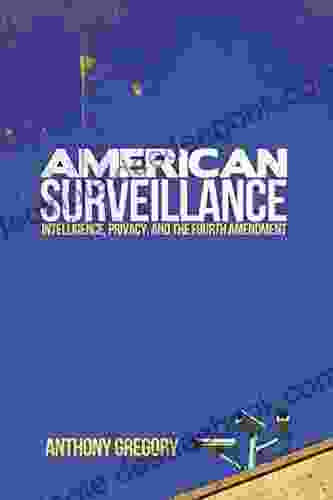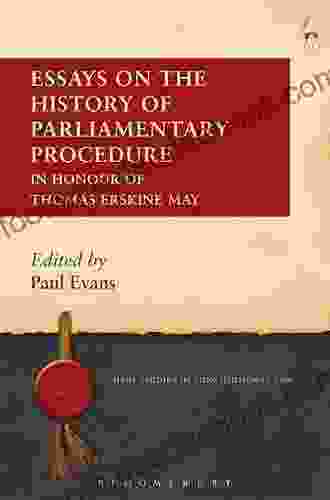American Surveillance, Intelligence, Privacy, and the Fourth Amendment: An In-Depth Examination

The Fourth Amendment to the United States Constitution is a fundamental pillar of American civil liberties, safeguarding the people's right to be free from unreasonable searches and seizures. However, the advent of modern surveillance technologies and the ever-present threat of terrorism have placed the Fourth Amendment under intense scrutiny, raising complex questions about the balance between national security and privacy rights.
5 out of 5
| Language | : | English |
| File size | : | 1490 KB |
| Text-to-Speech | : | Enabled |
| Screen Reader | : | Supported |
| Enhanced typesetting | : | Enabled |
| Word Wise | : | Enabled |
| Print length | : | 280 pages |
Historical Evolution of Surveillance in America
Surveillance in America has its roots in the colonial era, when British authorities routinely intercepted and read private correspondence. After the American Revolution, the Third Amendment prohibited the quartering of soldiers in private homes without the consent of the owner. However, the Fourth Amendment, adopted in 1791, provided the most comprehensive protection against unreasonable searches and seizures.
In the early 20th century, the emergence of wiretapping and other electronic surveillance techniques raised new Fourth Amendment concerns. The Supreme Court initially upheld the use of wiretaps in cases where there was probable cause of criminal activity. However, in 1967, the landmark case of Katz v. United States extended Fourth Amendment protection to wiretapping, requiring a warrant based on probable cause in most cases.
The Post-9/11 Surveillance Landscape
The terrorist attacks of September 11, 2001, transformed the American surveillance landscape. In the immediate aftermath of the attacks, Congress passed the Patriot Act, which expanded the government's authority to conduct surveillance and collect personal data. The National Security Agency (NSA) launched a mass surveillance program, collecting and storing vast amounts of telephone and internet communications.
These surveillance programs sparked widespread controversy, with critics arguing that they violated the Fourth Amendment and infringed upon privacy rights. In 2013, former NSA contractor Edward Snowden leaked classified information revealing the extent of the agency's surveillance activities. The revelations prompted a national debate about the balance between national security and civil liberties.
Fourth Amendment Challenges to Surveillance
The Fourth Amendment has been repeatedly challenged in the context of modern surveillance. One key issue is the definition of a "search" under the Fourth Amendment. In 2012, the Supreme Court ruled in United States v. Jones that attaching a GPS tracking device to a suspect's car without a warrant was a Fourth Amendment violation because it constituted a "physical intrusion."
Another issue is the collection of metadata, or information about communications, such as phone numbers, call duration, and location. The Supreme Court has not yet ruled on the Fourth Amendment implications of metadata collection, but lower courts have issued conflicting opinions.
Balancing National Security and Privacy Rights
The debate over surveillance, intelligence, and privacy has no easy answers. The government has a legitimate interest in protecting national security, but it must do so within the bounds of the Constitution. Privacy rights are essential to a free society, but they must be balanced against the need for public safety.
Finding the right balance requires careful consideration of the specific surveillance practices in question, the potential risks to national security, and the potential impact on privacy rights. It also requires ongoing dialogue and transparency between the government, law enforcement, and the public.
The relationship between American surveillance, intelligence gathering, privacy rights, and the Fourth Amendment is a complex and ever-evolving one. The Fourth Amendment provides important protections against unreasonable searches and seizures, but it must be interpreted and applied in a way that balances national security concerns with the fundamental rights of individuals.
The ongoing debate over surveillance and privacy is a testament to the importance of protecting civil liberties in a free and democratic society. By engaging in thoughtful and informed discussions, we can help ensure that the Fourth Amendment remains a cornerstone of American justice for generations to come.
5 out of 5
| Language | : | English |
| File size | : | 1490 KB |
| Text-to-Speech | : | Enabled |
| Screen Reader | : | Supported |
| Enhanced typesetting | : | Enabled |
| Word Wise | : | Enabled |
| Print length | : | 280 pages |
Do you want to contribute by writing guest posts on this blog?
Please contact us and send us a resume of previous articles that you have written.
 Book
Book Novel
Novel Chapter
Chapter Text
Text Paperback
Paperback Magazine
Magazine Newspaper
Newspaper Bookmark
Bookmark Shelf
Shelf Glossary
Glossary Synopsis
Synopsis Footnote
Footnote Manuscript
Manuscript Scroll
Scroll Codex
Codex Bestseller
Bestseller Library card
Library card Memoir
Memoir Reference
Reference Encyclopedia
Encyclopedia Dictionary
Dictionary Card Catalog
Card Catalog Borrowing
Borrowing Stacks
Stacks Archives
Archives Periodicals
Periodicals Study
Study Research
Research Scholarly
Scholarly Academic
Academic Journals
Journals Reading Room
Reading Room Special Collections
Special Collections Study Group
Study Group Thesis
Thesis Dissertation
Dissertation Storytelling
Storytelling Awards
Awards Book Club
Book Club Theory
Theory James Morton
James Morton Theo Walcott
Theo Walcott Lewis C Lin
Lewis C Lin Gerhard Adler
Gerhard Adler W H Wall
W H Wall Haley Lukas
Haley Lukas Marian L Thomas
Marian L Thomas Manning Marable
Manning Marable Richelle Mead
Richelle Mead Tierney James
Tierney James Gireesh Haridas
Gireesh Haridas Tighe E Zimmers
Tighe E Zimmers Teresa Ghilarducci
Teresa Ghilarducci Geoff Tennant
Geoff Tennant Rob Vlock
Rob Vlock Neel Patel
Neel Patel Andrea Chiarini
Andrea Chiarini Trevor Pryce
Trevor Pryce Pen Black
Pen Black Thomas D Lynch
Thomas D Lynch
Light bulbAdvertise smarter! Our strategic ad space ensures maximum exposure. Reserve your spot today!
 Manuel ButlerFollow ·2.6k
Manuel ButlerFollow ·2.6k Braden WardFollow ·10.4k
Braden WardFollow ·10.4k Christian BarnesFollow ·17k
Christian BarnesFollow ·17k Tim ReedFollow ·12.4k
Tim ReedFollow ·12.4k Shannon SimmonsFollow ·7.9k
Shannon SimmonsFollow ·7.9k Neil ParkerFollow ·16.9k
Neil ParkerFollow ·16.9k Dwight BellFollow ·17.6k
Dwight BellFollow ·17.6k Efrain PowellFollow ·9.9k
Efrain PowellFollow ·9.9k

 Allen Ginsberg
Allen GinsbergUnveiling the True Meaning of Enough: A Comprehensive...
: In the relentless pursuit of progress and...

 Clay Powell
Clay PowellHawker Hunter: The Jet Fighter that Shaped British...
Nestled in the halls of aviation...

 Alec Hayes
Alec HayesWhen and How to Use Lean Tools and Climb the Four Steps...
Lean is a management...

 Trevor Bell
Trevor BellVolume of Charlotte Mason Original Homeschooling: A...
Charlotte Mason's original...

 John Parker
John ParkerAscending Tristan da Cunha: A Comprehensive Guide to...
Prepare yourself for an extraordinary journey...
5 out of 5
| Language | : | English |
| File size | : | 1490 KB |
| Text-to-Speech | : | Enabled |
| Screen Reader | : | Supported |
| Enhanced typesetting | : | Enabled |
| Word Wise | : | Enabled |
| Print length | : | 280 pages |














